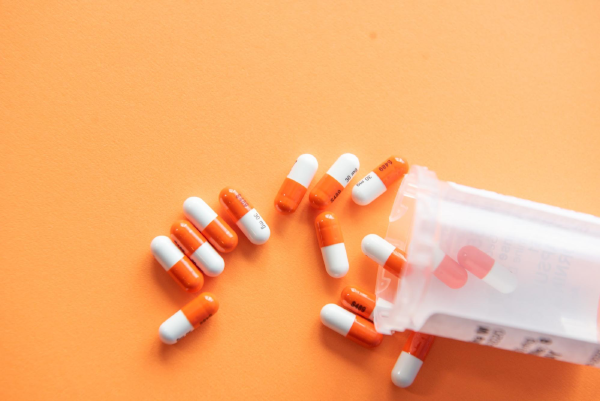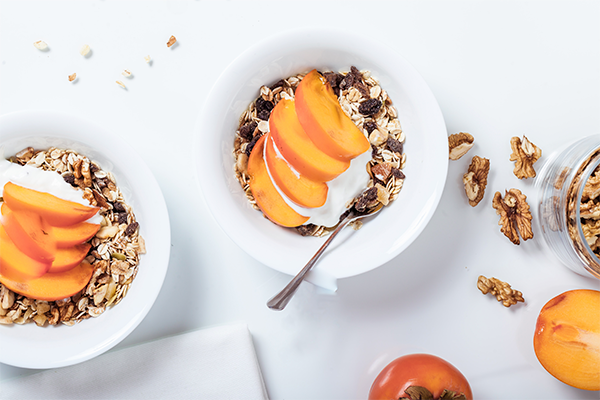Sugar is a type of simple carbohydrate that occurs naturally in many foods–from sweet potatoes to fruit, and even broccoli.
Yes, broccoli contains sugar.
So, if super healthy vegetables have sugar in them, is sugar really even that bad?
It’s not so much the natural sugars in foods that are the problem. It’s the added sugars like sucrose (table sugar) and high fructose corn syrup that we need to be most concerned about.
And, today, these added sugars can be found in nearly all processed or packaged foods.
Just how vigilant should we be about avoiding them? Let’s take a look at the most important ways added sugar harms your body and mind, so you can decide for yourself!
What Sugar Does To Your Body
Increases Your Risk of Heart Disease
Heart Disease is the number one leading cause of death in the U.S., accounting for one in every 6 deaths (2.8 million deaths per year). (1)
With all the talk about saturated fat and cholesterol, sugar has flown mostly under the radar as a major dietary contributor to heart disease.
Turns out, reducing saturated fat in the diet could actually increase people’s risk of heart disease (2). That’s because when saturated fats are reduced in foods, they are usually replaced with added sugars (like sucrose and high fructose corn syrup).
A diet high in added sugar has been found to cause a 3-fold increased risk of death due to cardiovascular disease. (3)
In the kingdom of cardiovascular health, lipids are king. These fat-like substances are found in your blood and include “good” (HDL) and “bad” cholesterol and triglycerides. And when sugar replaces saturated fat in the diet, it wreaks havoc on the lipid profile: LDL tends to rise, HDL tends to fall, and triglycerides tend to rise. This creates an increased risk of heart disease.
The American Heart Association recommends no more than 6 teaspoons (25 grams) of added sugar a day for women and 9 teaspoons (36 grams) for men. But the average daily intake is 22 teaspoons!

Feeds the Bad Gut Bacteria
There are tens of trillions of microbes that live in your digestive tract.
Your gut health–the diversity, balance, and population of this microbiome–is paramount to your health. It is necessary, not only for digesting food and absorbing essential nutrients but also for a strong immune system, peak brain function, avoiding fatigue and a balanced mood.
Sugar (and other refined carbs that convert quickly into sugar) feeds yeast, also known as candida. Given enough sugar-fuel, candida can quickly overpopulate the digestive tract, causing an imbalance in the healthy gut bacteria (called dysbiosis).
Dysbiosis can increase your risk of developing digestive diseases (ulcerative colitis, Crohn’s disease, celiac disease, irritable bowel syndrome), as well as chronic diseases like obesity and diabetes. (4)
It may also be the cause of your food allergies. (5)
The microbiome helps normalize the immune system, telling it not to overreact to harmless things, like eggs or nuts. So, when it gets out of balance, it can cause abnormal responses like food allergies.
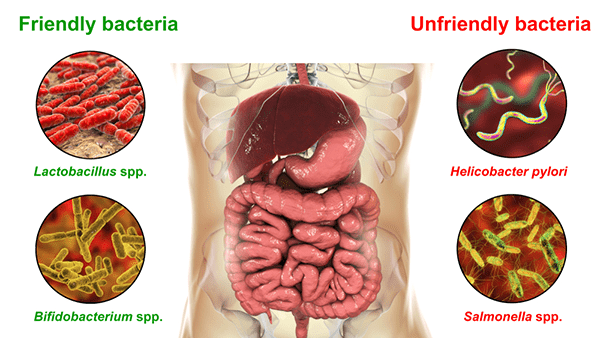
Leads to Weight Gain
Fact: People who drink sugary beverages weigh more than people who don’t. (6)
You’ve heard the term “empty calories?” Refined sugar adds calories, but zero nutritional value.
When you eat high-sugar foods, usually they are displacing foods that provide essential vitamins, minerals, and fiber, and micronutrients. If you eat a sugary muffin for breakfast, you probably aren’t also eating a veggie scramble!
Plus, sugar metabolizes quickly so it doesn’t fill you up the way calories from fat, protein, or fiber do. This means you feel hungrier faster after eating that muffin than you would after the veggie scramble. So you’re more likely to need between-meal snacks or eat more at the next meal.
This vicious cycle is exactly why people tend to consume more calories overall when they eat sugary foods.
Plus, sugar calories have unique properties that other, more nutritious calories do not.
They mess with your hormones–specifically the ones that regulate fat storage (insulin) and hunger (leptin and ghrelin)–making you feel hungry (even if you just ate) and telling your body to store fat (despite how many total calories you eat).
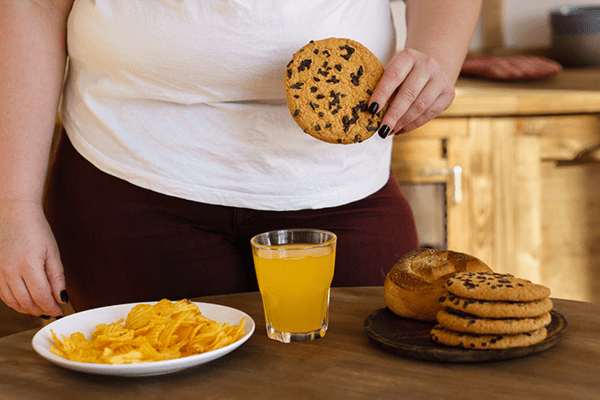
Makes You Age Faster
Aging is inevitable (and beautiful), but few of us want to be doing things to make it happen faster, right?
It’s called “glycation” and it happens when there is too much sugar in your bloodstream.
See, excess sugar (glucose) in your blood attaches to proteins. When it does this, it produces harmful free radicals called Advanced Glycation End Products (AGEs).
Collagen and elastin, the proteins that keep your skin plump and youthful, are especially vulnerable to the harmful effects of AGEs. These proteins become dry and brittle, leaving your skin more vulnerable to sun damage, wrinkles, and sagging.
But sugar doesn’t just make you look older, it ages your insides too.
These inflammatory AGEs are associated with most age-related diseases: memory loss and neurodegenerative diseases (Parkinson’s and Alzheimer’s), heart disease, arthritis, and cancer. (7, 8, 9)
Can Cause Liver Disease
Did you know you can get liver disease even if you never drink alcohol?
It’s called non-alcoholic fatty liver disease (NAFLD) and it occurs when too much fat accumulates in the liver.
It’s the most common liver condition affecting children in the U.S. and is highly correlated with obesity, insulin resistance, type 2 diabetes, and metabolic syndrome. It often has no symptoms and can lead to cirrhosis or liver cancer.
NAFLD is usually the result of, you guessed it, eating too much sugar–fructose, specifically.
Fructose is a type of sugar found naturally in fruits and some vegetables. Before modern sugar refining, fructose was limited in the human diet (most fruit contains only 5 to 10% fructose). Today, we have sucrose (white sugar) and high-fructose corn syrup (HFCS) which contain 50% and 55% fructose, respectively.
HFCS–added to most soft drinks and pre-packaged foods–is now the main source of fructose in the American diet. More than 50% of preschool children consume fructose-sweetened beverages. (10)
Unlike other sugars, which are mainly absorbed through the digestive tract, fructose is metabolized almost entirely by the liver. It triggers a whole host of chemical transformations in the liver. One of them, called lipogenesis, is the process by which the liver transforms fructose into fat.
Eating unnatural quantities of fructose in the form of added-sugars results in a gradual buildup of this fat within the liver cells. (11)
Consuming sugar-sweetened beverages for just 6 months is shown to increase liver fat. (12)
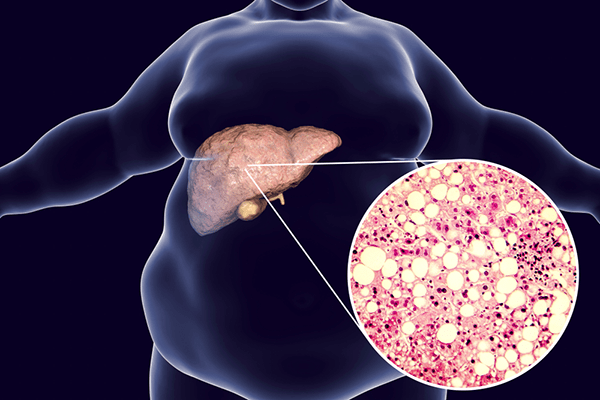
Contributes to Insulin Resistance and Type II Diabetes
The health of your organs, nerves, and blood vessels depends on your body’s ability to maintain stable blood sugar levels.
When you consume sugary foods, like ice cream, it causes your blood sugar (glucose) to spike. Your pancreas responds by producing insulin, a hormone that stabilizes blood sugar levels by telling cells to absorb the excess glucose and burn it for fuel.
A high-sugar diet, and the resulting high insulin levels can lead to something called insulin resistance. This is when cells stop responding to insulin and, thus, stop absorbing and burning glucose efficiently.
Insulin resistance increases the risk of developing prediabetes and, ultimately, type 2 diabetes. (13)
Can Fuel Cancer Growth
Cancer cells–big glucose feeders–thrive in high blood sugar environments. In fact, they consume sugar 10-12 times faster than healthy cells do. (14)
This likely explains why cancer patients showed tumor shrinkage when they adopted a ketogenic diet (high in fat and low in carbohydrates). (15) Similarly, mice with metastatic cancer were shown to survive longer on a ketogenic diet. (16)
A ketogenic diet decreases blood glucose, while increasing fatty acids and ketones, effectively starving out cancer cells.
See, normal, healthy cells can adapt to burn different sources for fuel–glucose, fatty acids, or ketones. Cancer cells, however, have defective mitochondria which cause them to be dependent mostly on glucose. (17)
Sugar is also highly inflammatory. And chronic inflammation increases your risk of developing cancer. (18)
What Sugar Does To Your Mind
Sugar doesn’t just harm your physical health. Both your memory and mood are negatively affected when you eat too much sugar.
Major depression is predicted to become the leading cause of disability in high-income countries by 2030. (19) And our high sugar consumption may be the main reason for this.
A diet high in refined sugar has been shown to decrease brain-derived neurotrophic factors (BDNF) and increase inflammation, both of which are associated with depression. (20, 21)
Glucose (blood sugar) is the main source of fuel for your brain. So, when you eat sugary foods that cause glucose levels to rapidly spike and drop, it impacts your ability to think, remember, and learn.
High blood sugar levels can even cause the brain to shrink. (22) One study showed that sugary drinks like soda and fruit juice are linked to preclinical Alzheimer’s disease: Poor memory and reduced brain volume. (23)
In fact, consuming just 1-2 sugary beverages per day is equivalent to 1.6 years of brain aging! (24)
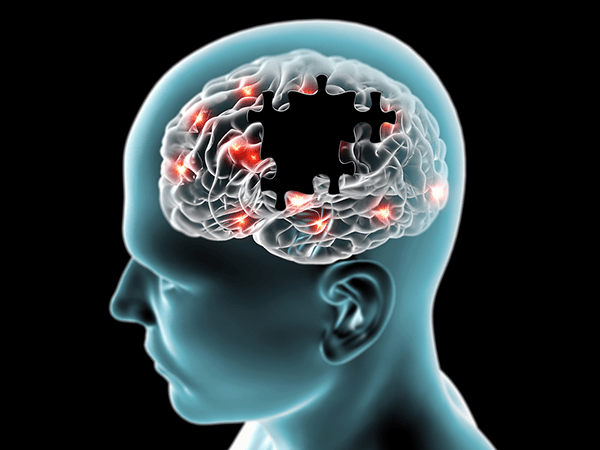
Tips to Cut Sugar
Ready to nix that sweet white poison from your diet?
Awesome!
First, you’ll want to do a system reboot. A 3-Day Sugar Detox is a great way to reset your blood sugar levels and eliminate those intense sugar cravings.
Once you’ve quit cold turkey, you can decide if you want to add back some natural sugars, like fruit, or even natural sweeteners like raw honey (in moderation, of course).
The best way to decide what, if any sweeteners are best for your health goals is to learn all the different ones that are out there. Don’t worry, we’ve compiled a whole list of sweeteners that explains the pros and cons of each one.
With a little effort and the right information, you can control your sugar intake and protect yourself from the harmful effects of added sugars.
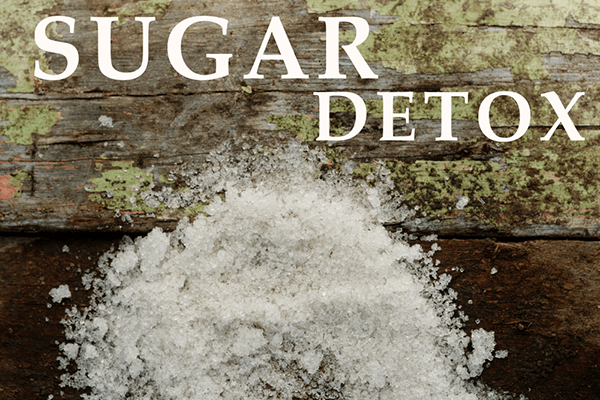
And don’t let the food companies fool you. There are lots of sneaky names for added sugar and it hides in some less-than-obvious places, like ketchup and almond milk. Read food labels closely and watch out for these:
- agave nectar
- anhydrous dextrose
- brown sugar
- confectioner’s sugar
- corn syrup
- corn syrup solids
- crystalline fructose
- dextrose
- evaporated cane juice
- fructose
- high-fructose corn syrup (HFCS)
- honey
- invert sugar
- lactose
- malt syrup
- maltose
- maple syrup
- molasses
- nectars (e.g., peach nectar, pear nectar)
- raw sugar
- sucrose
- sugar
- white granulated sugar
Final Thoughts
Sugar comes in many forms, and, no, not all of them are inherently bad. But added sugars are definitely bad.
When we consume too much sugar, usually in the way of added sugars, it can have some pretty serious effects on our health, happiness, and wellbeing.
A high-sugar diet can harm your heart health, feed cancer, impair your brain function and memory, and cause non-alcoholic fatty liver disease.
The best way to manage your sugar intake is to avoid sugary drinks and foods and to eat a diet consisting mainly of whole, unprocessed foods. Incorporating plenty of healthy protein, fats, and fiber will help you stay satiated and overcome those sugar cravings.
And, if you do decide to use sweeteners, be sure to learn about your options and decide which ones meet your health objectives. Always try to opt for more natural sources and, of course, use them sparingly.



